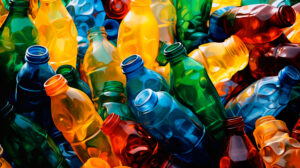
Researchers develop new method of recycling coloured plastics
Canadian Plastics
Materials Recycling Research & DevelopmentThe process breaks down coloured polymers into their original components.

Photo Credit: Adobe Stock/Jezper
Widely used in drinks bottles, food packaging, clothing, and electronics, coloured plastics can be melted down and remolded into new products, but here’s the problem: additives or colourants can’t be removed in current recycling processes. Which means this type of recycled material, which is of lower quality than the original, has to be downcycled into an item that’s also of lower quality. And these items typically can’t be recycled again, which cuts an item’s overall life cycle short.
But this vicious circle might just be on the verge of being broken thanks to a new chemical polymerization method for recycling coloured plastics recently developed by scientists at Cardiff University in Wales. The process, which breaks down coloured polymers into their original components, could lead to a circular plastic recycling economy reducing pollution on land and in our oceans, the Welsh researchers claim.
“Our current recycling economy only allows plastics and polymers to be recycled a finite number of times, after which they go to landfill or are incinerated,” said Dr. Ben Ward, senior lecturer in inorganic chemistry at Cardiff University. “This is a huge environmental challenge, and it’s also a problem for industry who want to reuse and recycle coloured polymers but are limited by additives which affect the quality and colour of recycled products.”
Using a reactor based in the labs at Cardiff University’s School of Chemistry, the team chose specific molecules known as monomers to make plastics that are strong and stable, while also adding in recyclability as part of the molecular design process. Further monomers were then added to the reactor to give the plastics colour while maintaining the same properties as the base materials.
Using depolymerization, the team were able to unmake their products returning them to the original monomers, making the plastics recyclable and more sustainable.
“What we’re showing is that this is a mechanism by which you can recycle plastics infinitely and that technology just doesn’t exist for traditional plastics,” Ward said. “While industry doesn’t currently have the infrastructure to use our approach to plastics recycling, we’re showing chemical viability, laying the baseline from which this can be done in the future.”
The team is currently working to refine the process further and make it more cost-effective, as well as ensuring that these new polymers can be processed for use in real-world products.
